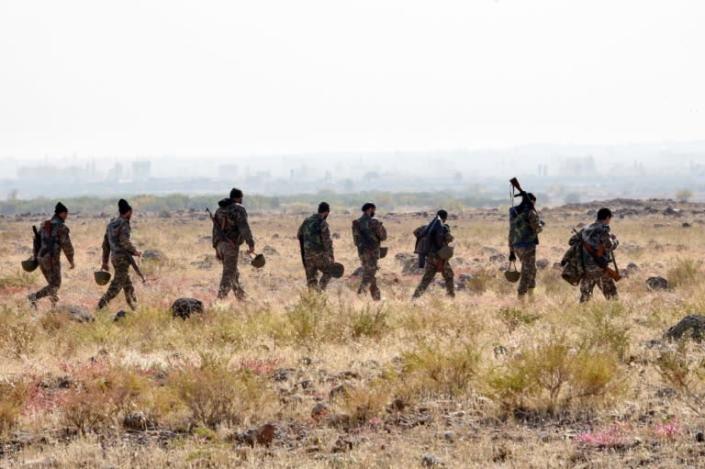
Russian President Vladimir Putin and Azerbaijan on Friday slammed “unacceptable” comments from French leader Emmanuel Macron’s on the decades-long conflict between arch foes Baku and Yerevan.
The Caucasus neighbours have fought two wars — in 2020 and in the 1990s — over Azerbaijan’s Armenian populated region of Nagorno-Karabakh.
Deadly clashes in September along the Armenian-Azerbaijani border have raised the fears of a fresh all-out conflict.
In comments to French television Wednesday, Macron accused Russia of “destabilising” and “seeking to create disorder” in the Caucasus.
The French leader’s remarks “show a lack of understanding of the course of the conflict,” Putin said during a meeting of leaders of Commonwealth of Independent States members in Kazakhstan.
He added that Macron’s accusations “sounded incorrect” and were “unacceptable”.
“There will be an opportunity” to “discuss” this with Macron, Putin said as he also invited the leaders of Armenia and Azerbaijan to Russia for talks “at any time, in any place”.
“Russia has always sincerely sought to resolve any conflicts, including issues related to Karabakh,” he said.
Macron also accused Azerbaijan of launching “a terrible war, with many deaths, atrocious scenes”.
More recently, “Azerbaijan has launched several offensives along the border (with Armenia). We have condemned them. We will not abandon Armenians,” he said.
The foreign ministry in Baku reacted angrily Friday, saying the remarks were “unacceptable and biased”.
“Azerbaijan is forced to reconsider France’s efforts in mediating” Armenian-Azerbaijani talks, it said.
– Future peace treaty –
On Friday Russia’s Foreign Minister Sergei Lavrov, Armenian counterpart Ararat Mirzoyan and Azerbaijan’s Jeyhun Bayramov met for talks in the Kazakh capital Astana.
Russian, Armenian, and Azerbaijani foreign ministries said the trio discussed joint efforts on normalising Azerbaijani-Armenian relations.
The meeting was held amid the growing Western engagement in the volatile Caucasus region, where Russia — distracted by its war in Ukraine — is visibly losing influence after decades of domination.
On Wednesday, Kremlin foreign policy advisor Yuri Ushakov criticised the “attempts of non-regional players — the EU and US — to wedge themselves in our work” on the region.
With Moscow increasingly isolated on the world stage following its February invasion of Ukraine, the US and the EU have taken a leading role in mediating the Armenia-Azerbaijan peace talks.
Last week, the European Union announced a “civilian EU mission” to Armenia to help delineate the borders with Azerbaijan.
Following a slew of diplomatic efforts from Brussels and Washington, Armenian and Azerbaijani foreign ministers met on October 3 in Geneva to begin drafting the text of a future peace treaty.
In September, more than 285 people were killed in border clashes at the Caucasus neighbours’ border, before a US-brokered truce ended the worst fighting since their 2020 war.
That six-week war in autumn 2020 claimed the lives of more than 6,500 troops from both sides and ended with a Russian-brokered ceasefire.
Under the deal, Armenia ceded swathes of territory it had controlled for decades, and Moscow deployed about 2,000 Russian peacekeepers to oversee the fragile truce.
When the Soviet Union collapsed in 1991, ethnic Armenian separatists in Nagorno-Karabakh broke away from Azerbaijan. The ensuing conflict claimed around 30,000 lives.
bur-im/jbr/gw




